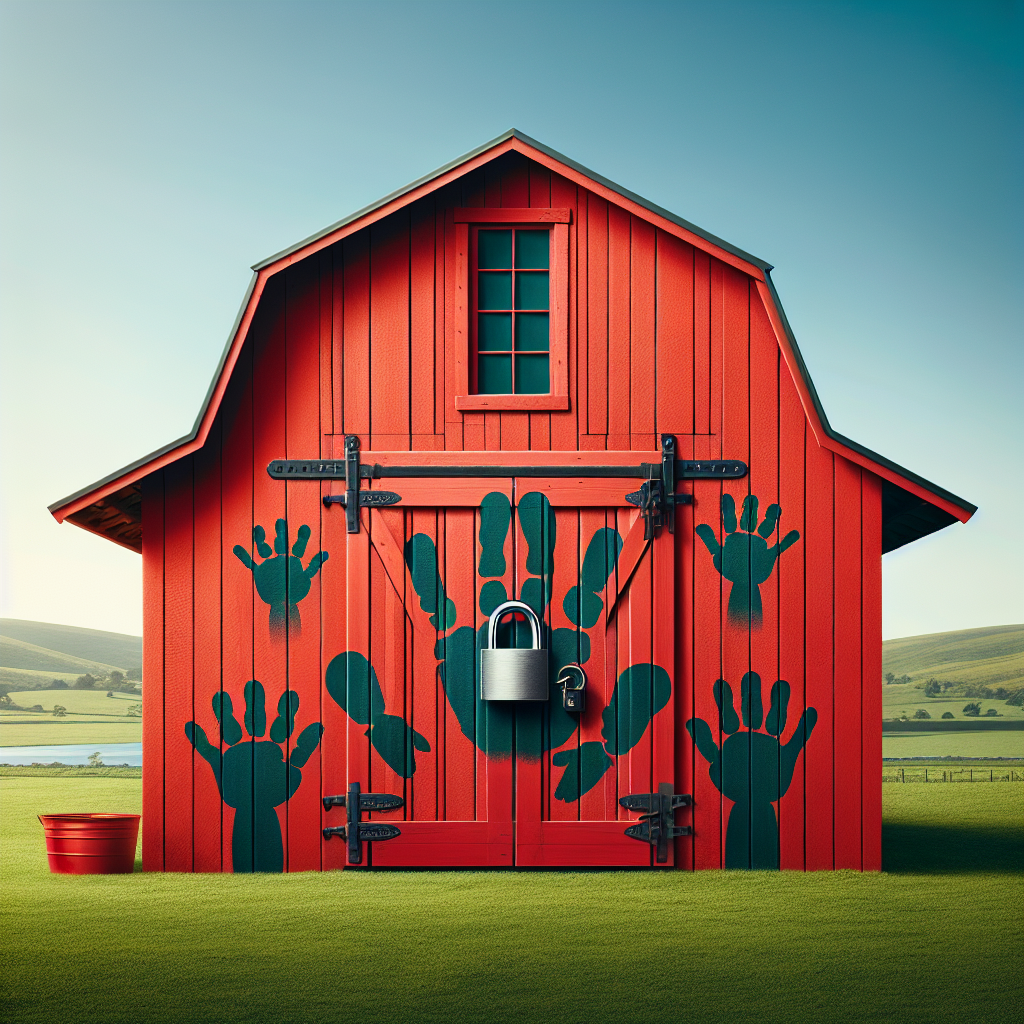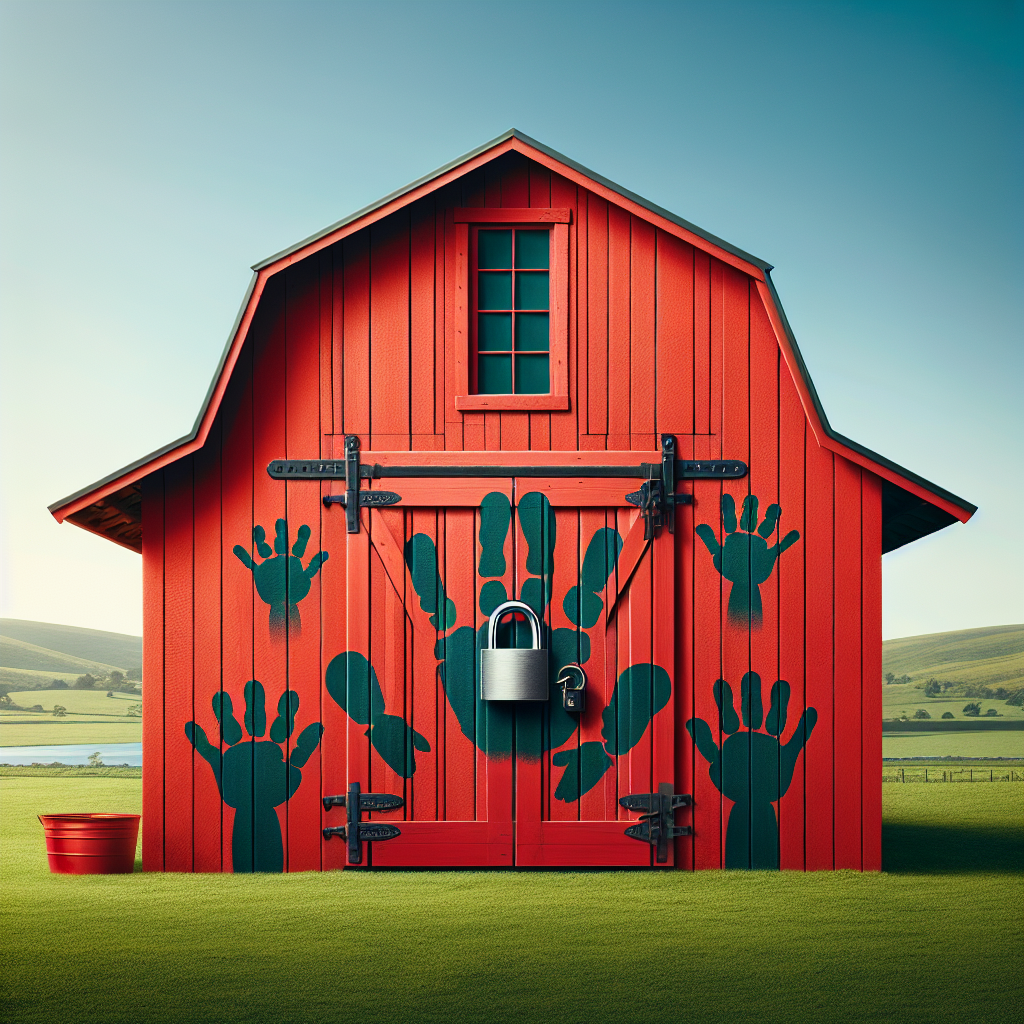This post may contain affiliate links which means I may receive a commission for purchases made through links. Learn more on my Private Policy page.
In the article “Farm Safety Tips for Keeping Children Safe,” you will find a wealth of practical guidelines on operating equipment around kids to ensure their safety on the farm. As parents and caretakers, it is essential to be aware of potential hazards and take proactive measures to protect our little ones in this unique environment. With these farm safety tips, you can create a secure environment where children can learn, explore, and enjoy the farm experience while avoiding potential accidents or injuries. From equipment safety to age-appropriate tasks, this article will equip you with the knowledge to keep children safe on the farm.
Understanding the Risks
Identifying potential dangers on a farm
When it comes to farm safety, it’s important to be aware of the potential dangers that exist. Farms can be filled with hazards such as machinery, animals, chemicals, and bodies of water. Identifying these potential dangers is the first step in keeping children safe on a farm. By being aware of the risks, parents and caregivers can take necessary precautions to prevent accidents and injuries.
Specific risks for children on a farm
Children face specific risks on a farm due to their young age and lack of experience. Some of these risks include falls, animal-related injuries, drowning, and accidents involving farm equipment. It’s important to acknowledge these risks and implement measures to mitigate them. By understanding these specific risks, parents can ensure a safe environment for their children on the farm.
Effects of child injury or accident on a farm
Child injuries or accidents on a farm can have profound and long-lasting effects. Not only can they cause physical pain and trauma, but they can also lead to emotional distress and financial burdens. It’s crucial to understand that preventing such incidents is of utmost importance to protect the well-being and future of children. By prioritizing farm safety, we can avoid the devastating effects of child injury or accidents.
Safety Around Animals
Educating children about behavior around farm animals
Educating children about proper behavior around farm animals is essential for their safety. Children should be taught to approach animals cautiously, avoid sudden movements, and never disturb them while they are eating or sleeping. It’s also crucial to explain the importance of respecting animal boundaries and recognizing their body language as a means of understanding their behavior. By educating children about animal behavior, we can help prevent potential animal-related injuries.
Preventing animal-related injuries
Prevention is key when it comes to animal-related injuries on the farm. This includes implementing safety measures such as installing fences and gates to keep animals contained and separating different species to avoid conflicts. Additionally, providing proper training and supervision when children interact with animals can significantly reduce the risk of injuries. By taking these preventive measures, we can create a safer environment for both children and farm animals.
Proper hygiene practices after handling animals
After handling animals on the farm, it’s crucial to practice proper hygiene to prevent the spread of diseases. Children should be taught to thoroughly wash their hands with soap and water, especially before eating or drinking. Additionally, it’s important to emphasize the importance of wearing appropriate protective clothing, such as gloves, when handling animals to minimize the risk of contamination. By instilling good hygiene practices, we can maintain a healthy and safe environment on the farm.

Farm Equipment Safety
Basics of farm equipment safety for children
Farms often have various types of equipment that pose potential risks for children. It’s important to teach children the basics of farm equipment safety, such as the dangers of moving parts, the importance of staying clear of machinery in operation, and the significance of following instructions and warning labels. By educating children about farm equipment safety, we can help them understand the potential hazards and how to stay safe.
Rules for operating equipment around kids
When operating farm equipment in the presence of children, it’s crucial to establish and enforce strict rules for their safety. Children should be strictly prohibited from operating any machinery unless under appropriate adult supervision and with proper training. Additionally, it’s important to emphasize the importance of maintaining a safe distance from operating equipment to avoid accidents. By implementing these rules, we can ensure the well-being of children around farm equipment.
Teaching children about the dangers of playing on or near equipment
Playing on or near farm equipment can be extremely dangerous for children. It’s essential to teach children about the potential dangers of climbing on machinery, entering restricted areas, or playing around moving parts. By creating awareness about the risks associated with playing on or near equipment, we can prevent accidents and injuries on the farm.
Hazardous Substances on the Farm
Pesticides and other dangerous chemicals
The use of pesticides and other dangerous chemicals is common on farms, and they can pose significant health risks, especially to children. It’s important to educate children about the dangers of pesticides and chemicals and the importance of staying away from areas where they are being used. By ensuring that children understand the hazards associated with these substances, we can protect their health and well-being.
Fuel and other flammable materials
Fuel and other flammable materials should be handled with extreme caution on the farm. Children should be educated about the dangers of playing near fuel storage areas, open flames, or machinery that uses fuel. By teaching children safe practices around flammable materials, we can reduce the risk of accidents and potential fires on the farm.
Safety measures for handling and storing harmful substances
Proper handling and storage of harmful substances are crucial for farm safety. It’s important to store chemicals and other hazardous materials in locked cabinets or containers, out of reach of children. Additionally, children should be taught about the importance of using personal protective equipment when handling these substances, such as gloves and masks. By implementing safety measures for handling and storing harmful substances, we can minimize the risk of exposure and ensure the well-being of children on the farm.

Farm Vehicle Safety
Instructing kids about the risks of farm vehicles
Farm vehicles, such as tractors and trucks, can pose significant risks to children if not used and operated properly. It’s important to instruct children about the risks associated with farm vehicles, including the dangers of riding on them without proper permission and the significance of staying away from areas where vehicles are in operation. By educating children about the risks of farm vehicles, we can help them make informed decisions and stay safe.
Proper usage of seat belts and car seats in farm vehicles
Just like in any other vehicle, the usage of seat belts and car seats is crucial for farm vehicle safety. Children should be taught to always wear seat belts and be properly secured in appropriate car seats whenever riding in a farm vehicle. By ensuring that seat belts and car seats are used correctly, we can minimize the risk of injuries in the event of an accident.
Ensuring children do not ride on tractor loaders or other farm machinery
Children should never be allowed to ride on tractor loaders or other farm machinery. These machines are not designed to carry passengers, and doing so can lead to serious injuries or even fatalities. It’s important to emphasize to children the dangers of riding on these types of machinery and enforce strict rules against it. By prohibiting children from riding on farm machinery, we can protect their safety and well-being.
Water Safety
Discussing the potential dangers of on-farm bodies of water
Bodies of water on the farm, such as ponds, creeks, or irrigation canals, can present significant risks to children. It’s necessary to discuss the potential dangers associated with on-farm bodies of water, including the risk of drowning and the importance of never swimming or playing in these areas without adult supervision. By raising awareness about these dangers, we can help children understand the importance of water safety on the farm.
Preventing accidental drownings
Preventing accidental drownings should be a top priority when it comes to water safety on the farm. Children should always be supervised by a responsible adult when near bodies of water, and barriers such as fences or gates should be installed to prevent unsupervised access. It’s also essential to teach children how to swim and provide appropriate flotation devices when necessary. By implementing preventive measures and promoting water safety, we can significantly reduce the risk of accidental drownings.
Teaching kids how to swim and supervise their activities near water
Teaching children how to swim is an important skill that can enhance their safety around water. Enrolling children in swimming lessons at an early age can help them develop the necessary skills and confidence to stay safe around bodies of water. Additionally, close supervision should always be maintained when children are near water, even if they know how to swim. By combining swimming lessons with constant supervision, we can provide children with the tools and knowledge to enjoy water activities safely.
Emergency Preparedness
Teaching children about emergency situations
Preparing children for emergency situations is crucial for their safety on the farm. Children should be taught about different types of emergencies and how to respond to them, including storms, fires, or accidents. It’s important to explain the importance of staying calm, seeking help from adults, and following evacuation procedures when necessary. By educating children about emergency situations, we can empower them to make informed decisions and protect themselves in critical situations.
Creating and practicing emergency exit routes
Creating and practicing emergency exit routes is an essential part of emergency preparedness on the farm. Children should be familiar with escape routes in different areas of the farm and know how to navigate them safely. Regular drills can help children become familiar with evacuation procedures and ensure a quick and efficient response in case of an emergency. By establishing and practicing emergency exit routes, we can increase the chances of a successful evacuation and minimize potential risks.
First aid training for children and adults on the farm
First aid training is a valuable skill that can make a significant difference in emergency situations on the farm. Children and adults should receive basic first aid training to be able to provide immediate assistance in case of an injury or accident. By equipping both children and adults with first aid skills, we can enhance the safety and well-being of everyone on the farm.
Child Supervision on Farms
Importance of adult supervision on a farm
Adult supervision is crucial for ensuring the safety of children on a farm. The presence of responsible adults can help prevent accidents, provide guidance, and intervene in potentially dangerous situations. It’s essential to prioritize adult supervision to keep children safe during farming activities.
Watching over children around farming activities
When children are engaged in farming activities, it’s important to maintain a watchful eye to ensure their safety. This includes consistently monitoring their behavior and interactions with animals, machinery, water, and other potential hazards. By actively watching over children, we can detect and prevent potential risks before they turn into accidents.
Providing safe play areas away from work zones
Creating safe play areas away from work zones is essential for child safety on the farm. These designated areas should be free from potential hazards such as machinery, animals, or dangerous substances. By providing safe play areas, children can engage in recreational activities without being exposed to unnecessary risks.
Safe Farming Practices
Routine safety checks and repairs
Routine safety checks and repairs are necessary to maintain a safe farming environment. It’s important to regularly inspect machinery and equipment for any signs of damage or malfunction. Fixing issues promptly and efficiently can prevent potential accidents and ensure the safe operation of farm equipment.
Implementing safety rules on a farm
Implementing and enforcing safety rules on a farm is crucial for preventing accidents and injuries. Safety rules should cover all aspects of farm activities, including animal handling, operating machinery, and playing near potential hazards. By establishing clear safety rules and consistently enforcing them, we can create a culture of safety on the farm.
Keeping the farm tidy to prevent accidents
Keeping the farm tidy is an essential practice for accident prevention. This includes properly storing tools and equipment, removing clutter and debris from work areas, and maintaining a clean environment. By keeping the farm tidy, we can minimize the risk of accidents caused by tripping, falling, or the improper handling of objects.
Raising Awareness About Farm Safety
Using technology to educate about farm safety
Technology can be a powerful tool for raising awareness about farm safety. Websites, mobile applications, and online resources can provide information, guidelines, and interactive tools to educate children, parents, and caregivers about farm safety practices. By harnessing technology, we can reach a wider audience and provide accessible and engaging education about farm safety.
Participating in farm safety programs
Participating in farm safety programs can help promote and reinforce safe practices on the farm. These programs often provide resources, training, and support to farmers and their families in order to enhance farm safety. By actively engaging in farm safety programs, we can stay up-to-date with the latest safety guidelines and connect with a community that prioritizes farm safety.
Promoting a culture of safety on the farm
Building a culture of safety on the farm is essential for ensuring the well-being of children and everyone involved. This culture starts with the understanding that safety is a shared responsibility and should be prioritized in all farm activities. By promoting a culture of safety, we can create an environment where safe practices are ingrained in daily routines and where farm safety becomes a non-negotiable priority.
In conclusion, farm safety is of utmost importance when it comes to protecting children on the farm. By understanding the risks, implementing safety measures, and raising awareness, we can create a safe and nurturing environment for children to grow and thrive. Farm safety is not just a responsibility, but a commitment to the well-being of our future generation.
This post may contain affiliate links which means I may receive a commission for purchases made through links. Learn more on my Private Policy page.

